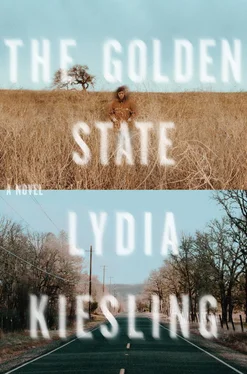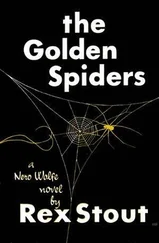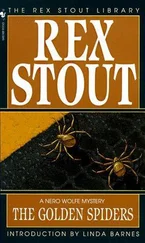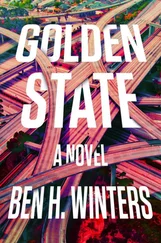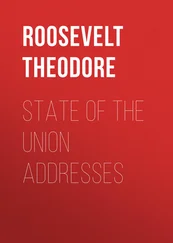Lydia Kiesling - The Golden State
Здесь есть возможность читать онлайн «Lydia Kiesling - The Golden State» весь текст электронной книги совершенно бесплатно (целиком полную версию без сокращений). В некоторых случаях можно слушать аудио, скачать через торрент в формате fb2 и присутствует краткое содержание. Город: New York, Год выпуска: 2018, ISBN: 2018, Издательство: MCD, Жанр: Современная проза, на английском языке. Описание произведения, (предисловие) а так же отзывы посетителей доступны на портале библиотеки ЛибКат.
- Название:The Golden State
- Автор:
- Издательство:MCD
- Жанр:
- Год:2018
- Город:New York
- ISBN:978-0-374-71806-0
- Рейтинг книги:5 / 5. Голосов: 1
-
Избранное:Добавить в избранное
- Отзывы:
-
Ваша оценка:
- 100
- 1
- 2
- 3
- 4
- 5
The Golden State: краткое содержание, описание и аннотация
Предлагаем к чтению аннотацию, описание, краткое содержание или предисловие (зависит от того, что написал сам автор книги «The Golden State»). Если вы не нашли необходимую информацию о книге — напишите в комментариях, мы постараемся отыскать её.
The Golden State — читать онлайн бесплатно полную книгу (весь текст) целиком
Ниже представлен текст книги, разбитый по страницам. Система сохранения места последней прочитанной страницы, позволяет с удобством читать онлайн бесплатно книгу «The Golden State», без необходимости каждый раз заново искать на чём Вы остановились. Поставьте закладку, и сможете в любой момент перейти на страницу, на которой закончили чтение.
Интервал:
Закладка:
“Where did you go in Turkey?” I ask. She is silent for a while looking at a point past Honey. “First we stayed in the city, with a lecturer from one of the universities.” She returns her gaze to me. “He had a beautiful wife named Gonul, I remember.” “Gönül,” I say reflexively, and years of vocabulary memorization kicks into gear like a tic (Gönül: heart ; Gönüllü: with heart, volunteer ). “It means ‘heart,’” I say. “That suits her,” the woman says. “She was very kind. They lived in a cold-water flat in one of those neighborhoods with the gorgeous wooden houses.” “Ah,” I say. “She had a little girl, I don’t remember her name. That’s who taught me ‘seni seviyorum.’” She shakes her head. “Imagine remembering that after all these years.” She smiles kindly at me, the first smile she has produced. “It must be something about hearing you say it.” Honey is still staring at her stupefied which is downright weird and I poke her. “Can you say hello?” I say. “This is Honey. Well, actually Meltem. Turkish.” “Pretty,” the crone says.
Honey comes to life and starts kicking and wanting to be let out and as sometimes happens when I’m out with her I worry so much she’s going to make a big scene that I get a fight-or-flight thing and say “You know I’d really love to keep talking but I should probably get her home for a nap,” and the woman waves her hand toward the door and I say “I’m Daphne. What was your name?,” which is a weird verb tense, and she says “Alice” and Honey wails and I say “Alice it’s so nice to meet you, I hope we will see you again tomorrow!” and I fire the stroller out the door like a shot even though as soon as I leave I regret running from what is likely to be the most interesting conversation I have all day week month year.
I let Honey out of the stroller and she does her spunky little run down the sidewalk until her head gets the better of her and she topples over hard and cries and I hustle to pick her up and cuddle her before she wants down again. While we walk home I think about what we are going to eat and I think she had Cheerios this morning which means she could have an egg which is nutritious and protein-filled and wouldn’t be a repeat and I think egg and berries and yogurt although that’s the last thing that I personally want to eat and wonder if I could somehow get a burger and shake from the Frosty and eat it away from her prying eyes.
Finally we are home, or back at the house, and I scramble us four eggs and split them between two plates and I slice up strawberries and put yogurt in a bowl and set her in the high chair and set myself down next to her and think once she goes down for a nap I can eat the bag of Lays.
It takes her a very long time to go to sleep. I open the bedroom window so I can hear her outside and her shouts and moans echo around the deck while I eat the chips drink a glass of water and then smoke a cigarette. It’s 12:10, early for her nap but I decide to wait her out and finally the sounds stop and after ten minutes it’s safe to assume she’s out.
Now I have peace and quiet but again it occurs to me that I don’t really have anything to do and I think I should force myself to go in the garage and see what’s there, all my parents’, really my mom’s, linens and books and art that I haven’t been able to bring myself to dispose of but which would require some more substantial dwelling than I have to display. They are an adult person’s things, rugs and engravings and whatnot, which would be absurd in our tiny apartment. It occurs to me briefly to unpack everything and just put it around the mobile home but imagining her things against the faux-wood panels makes me itch. Moreover I don’t trust the town’s youth—the meth kids imagined although in fairness not actually seen—to not eventually break in and trash the place. I collect my cigarettes and phone and go inside and poke my head in at Honey and she is sleeping with her cheek mashed against the floor of the Pack ’n Play and her hands by her sides and her butt up in the air, and I back out of the closet stealthily and make my way to the pantry and out the back door into the heat and down the steps and to the garage where I gird my nerves and then hoist up the door and step into the pleasingly dim cool space smelling faintly of something motor-related, or the kind of oil I imagine you’d put on a baseball mitt.
And there it all is, my little Aladdin’s cave, the beautiful rugs piled in the corner on the side where the pickup truck used to go, a love seat and Mom’s prized formal settee beside them shrouded in a blue tarp, some smaller lumps that I think are a mother-of-pearl inlay coffee table and an ottoman wrapped neatly in butcher paper. Art boxes lean up against the Snap-on tools workbench, all the housewares boxed up into pyramids on the side where the Buick used to live. My parents had me late and there were eight years on the road before and eleven years on the road after I was born; ample time for Mom to collect treasures, the acquisition of textiles being almost a formal perk of foreign service wifehood. I walk over to the rug pile and run a hand over a deep blue and red kilim on the top and give it an appraising sniff and it is pleasingly devoid of damp. I pick one of the boxes and pull up its tape and open its flaps and inside see what are obviously dishes of various sizes wrapped up in tissue paper. Uncle Rodney and I packed up Mom’s bungalow in Sac and he uncomplainingly hauled everything all the way up here with his truck. I took their iron bedframe, lugged it to grad school, and now it’s in our apartment in the City. I unwrap the top dish and it’s a jewel-blue glazed ceramic ashtray, “Tunis” painted on its base in Arabic and the name of some hotel. I carry it over to the settee and throw off the tarp. Beneath it the strangely pristine white jacquard is protected by yet another nest of plastic, and I sit down on this and put the ashtray on its arm and put my feet on the ottoman-shaped lump and light a cigarette, relishing the taboo feeling of indoor smoking, even just in a garage. “Hi Mom,” I say to the stuff. “Hi Dad,” I say to the urn, which is perched where I left it on the top shelf of the steel shelving at the back of the garage, a terra-cotta number allegedly acquired in the village where my parents met in Corfu.
I take my phone out of my pocket and snap a picture of the garage to send at some future Wi-Fi-enabled point to Engin with the caption “çeyizim.” This is a joke we made on his first visit, that all this stuff here in the garage is my dowry, my trousseau rather. Obviously it was a joke, although in Turkey it’s not strange for parents to feather the nest for newlyweds—I guess they do that in America too, if you’re lucky they just buy the whole nest. I do come to the marriage with an impressive hoard of housewares and no siblings to squabble over them, even though we have no grown-up-seeming place to put them.
Our wedding, or the grouping of events that I think of together as “our wedding,” was dictated by procedural matters. His mother and aunt, with what was really extraordinarily good grace given that I was a foreigner and that we had only been together for a few months when we decided to get married—I mean we had been together before but as far as they were concerned I arrived out of a clear blue sky—threw us a sort of lite version of the engagement ceremony at his mom’s house and then later a really nice dinner in a restaurant. Part of it was I think they felt terrible for me because I had almost no family members and so everyone swallowed their alarm and conspired to make a fuss over us. And at least I spoke Turkish, not anything like flawlessly but I make an effort with my idioms.
The restaurant thing was supposed to follow a Turkish civil ceremony in a municipal hall, the official wedding ceremony. Originally when I found out I got the Institute job we were going to do a legally sanctioned thing and get married in Turkey and then apply for the U.S. K-3 nonimmigrant visa from Turkey, which is kind of a combo fiancé/marriage visa which would have let us start the process in Turkey and let Engin come to the U.S. with me and then do the rest of the applying there. But then we were advised by acquaintances and the Internet that this visa was basically nonoperational. And the K-1 fiancé visa takes eons, up to a year, and you can’t be together in the U.S. while you wait. So then we decided that we would forgo an official Turkish marriage and just have a nice dinner and then commit what I consider to be mild visa fraud by taking advantage of a loophole in U.S. visa policy that allows you to apply for a fiancé visa as a sort of fait accompli. Your honey comes to the U.S. on a three-month tourist visa, and you get married right before the three months is up, the idea being that your passion is such that it can be satisfied only through immediate entry into the marital estate. You have only a few family and friends, which is conveniently how many family and friends I have, you take a few pictures, you file simultaneously the I-130 Petition for Alien Relative and the I-485 Application to Register Permanent Residence or Adjust Status for your spouse who has now overstayed the B-2 tourist visa, and you spend a thousand dollars in fees and throw yourself on the mercies of a sympathetic visa officer who asks you a bunch of invasive questions and wants to see your text messages and makes you swear up and down you had no intent to marry when your honey got his tourist visa, and then you avoid leaving the U.S. until the green card is secured. That’s how Engin got his green card, the one which let us make a baby and from which it should have been a sure thing to move to citizenship. The miracle is that we got that one effortlessly, and then lost it basically through a malicious fluke. It’s obvious from all of this stuff incidentally, that they don’t want you to marry someone who’s not from the fucking United States, all you have to do is read the reams of alphanumeric gibberish on the relevant websites.
Читать дальшеИнтервал:
Закладка:
Похожие книги на «The Golden State»
Представляем Вашему вниманию похожие книги на «The Golden State» списком для выбора. Мы отобрали схожую по названию и смыслу литературу в надежде предоставить читателям больше вариантов отыскать новые, интересные, ещё непрочитанные произведения.
Обсуждение, отзывы о книге «The Golden State» и просто собственные мнения читателей. Оставьте ваши комментарии, напишите, что Вы думаете о произведении, его смысле или главных героях. Укажите что конкретно понравилось, а что нет, и почему Вы так считаете.
